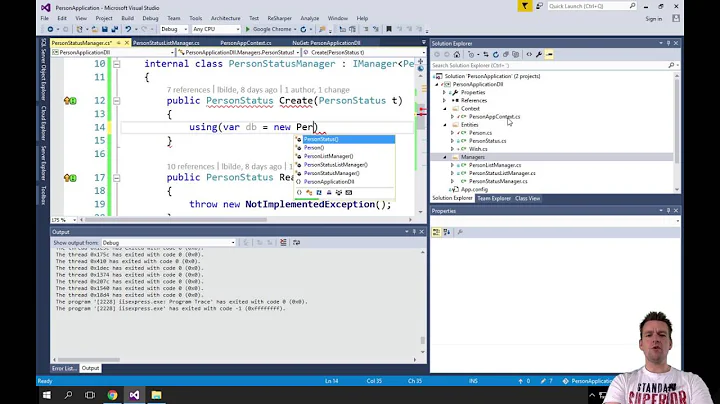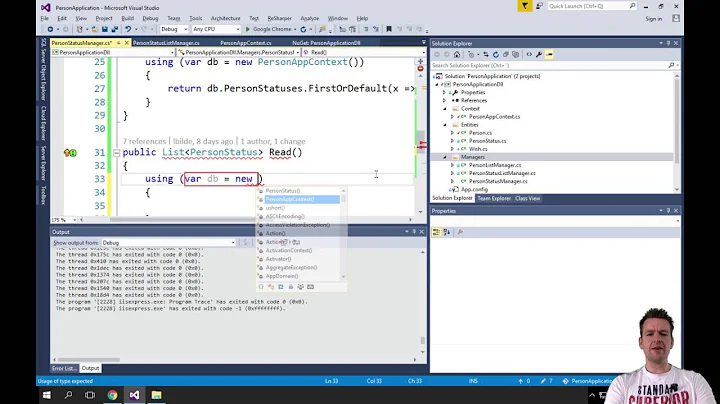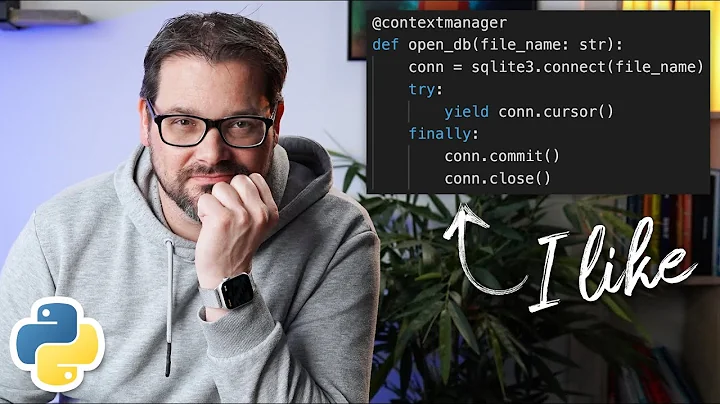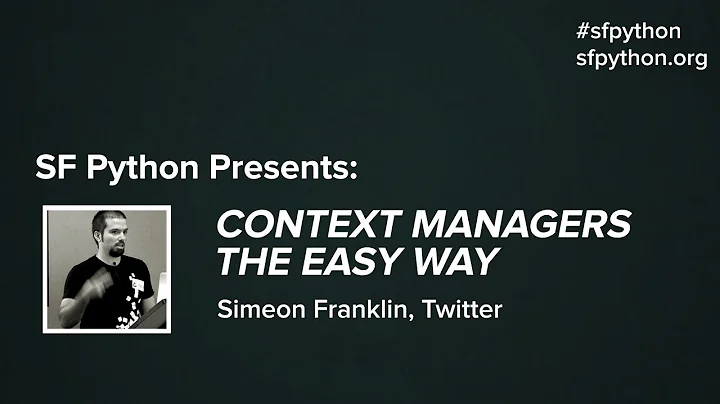Create a "with" block on several context managers?
Solution 1
In Python 2.7 and 3.1 and above, you can write:
with A() as X, B() as Y, C() as Z:
do_something()
This is normally the best method to use, but if you have an unknown-length list of context managers you'll need one of the below methods.
In Python 3.3, you can enter an unknown-length list of context managers by using contextlib.ExitStack:
with ExitStack() as stack:
for mgr in ctx_managers:
stack.enter_context(mgr)
# ...
This allows you to create the context managers as you are adding them to the ExitStack, which prevents the possible problem with contextlib.nested (mentioned below).
contextlib2 provides a backport of ExitStack for Python 2.6 and 2.7.
In Python 2.6 and below, you can use contextlib.nested:
from contextlib import nested
with nested(A(), B(), C()) as (X, Y, Z):
do_something()
is equivalent to:
m1, m2, m3 = A(), B(), C()
with m1 as X:
with m2 as Y:
with m3 as Z:
do_something()
Note that this isn't exactly the same as normally using nested with, because A(), B(), and C() will all be called initially, before entering the context managers. This will not work correctly if one of these functions raises an exception.
contextlib.nested is deprecated in newer Python versions in favor of the above methods.
Solution 2
UPDATE: Starting in python 3.10, you'll be able to use parenthesized context managers! Thanks @iforapsy!
with (
mock.patch('aaaaaaaaaaaaaaaaaaaaaaaaaaaaaaaaaaaaaaaaaaaaa') as a,
mock.patch('bbbbbbbbbbbbbbbbbbbbbbbbbbbbbbbbbbbbbbbbbb') as b,
mock.patch('cccccccccccccccccccccccccccccccccccccccccc') as c,
):
do_something()
Original Answer For python versions < 3.10
@interjay's Answer is correct. However, if you need to do this for long context managers, for example mock.patch context managers, then you quickly realize you want to break this across lines. Turns out you can't wrap them in parens, so you have to use backslashes. Here's what that looks like:
with mock.patch('aaaaaaaaaaaaaaaaaaaaaaaaaaaaaaaaaaaaaaaaaaaaa') as a, \
mock.patch('bbbbbbbbbbbbbbbbbbbbbbbbbbbbbbbbbbbbbbbbbb') as b, \
mock.patch('cccccccccccccccccccccccccccccccccccccccccc') as c:
do_something()
Solution 3
The first part of your question is possible in Python 3.1.
With more than one item, the context managers are processed as if multiple with statements were nested:
with A() as a, B() as b: suiteis equivalent to
with A() as a: with B() as b: suiteChanged in version 3.1: Support for multiple context expressions
Solution 4
The second part of your question is solved with contextlib.ExitStack in Python 3.3.
Solution 5
Following on from @sage88's response you can always assign those patches to have meaningful variable names before you enter into them.
You could create those patches in multiple lines
a_patch = mock.patch('aaaaaaa')
b_patch = mock.patch('bbbbbbb')
c_patch = mock.patch('ccccccc')
with a_patch as a, b_patch as b, c_patch as c:
do_something()
Related videos on Youtube
olamundo
Updated on August 11, 2021Comments
-
olamundo over 2 years
Suppose you have three objects you acquire via context manager, for instance A lock, a db connection and an ip socket. You can acquire them by:
with lock: with db_con: with socket: #do stuffBut is there a way to do it in one block? something like
with lock,db_con,socket: #do stuffFurthermore, is it possible, given an array of unknown length of objects that have context managers, is it possible to somehow do:
a=[lock1, lock2, lock3, db_con1, socket, db_con2] with a as res: #now all objects in array are acquiredIf the answer is "no", is it because the need for such a feature implies bad design, or maybe I should suggest it in a pep? :-P
-
 Graham over 5 years
Graham over 5 years -
 Graham over 5 years@timgeb I've started a discussion about this duplicate closure. My apologies for not @-notifying you sooner; it slipped my mind.
Graham over 5 years@timgeb I've started a discussion about this duplicate closure. My apologies for not @-notifying you sooner; it slipped my mind.
-
-
olamundo almost 14 yearsthanks! but that still didn't answer my whole question: what about the 2nd case I mentioned, where the context managers are given in an array, without knowing how many mangers are there in the array. will it be possible in some python3.X to do
with [cm1,cm2,cm3,cm4,cm5] as result: .... -
Mark Byers almost 14 years@noam: To solve the second part of your question you could write a class to wrap a number of resources and implement
__enter__and__exit__for that class. I'm not sure if there's a standard library class that does this already. -
olamundo almost 14 yearsthanks! So I can use this for an array of context managers with
contextlib.nested(*arr).<br> Is this possible somehow in python 2.7 and 3.1's new syntax? -
interjay almost 14 years@noam: No, in fact the docstring for
nestedin 3.1 says: "The one advantage of this function over the multiple manager form of the with statement is that argument unpacking allows it to be used with a variable number of context managers as follows:with nested(*managers): do_something()" -
olamundo almost 14 yearsOdd, on one hand it's deprecated, but on the other they acknowledge an advantage of the deprecated module over the replacement?
-
glglgl almost 11 years@Mark I don't think it is that easy - that's why
contextlib.nested()is deprecated. If something happens between the generation of the other things and the activation of the context manager, it might happen that the cleanup doesn't happen as wanted. -
Martijn Pieters almost 11 years@noam: no,
contextlib.ExitStackis the replacement forcontextlib.nested(). -
Martijn Pieters almost 11 yearsBut usually this makes no difference. It makes a huge difference if
B()orC()raises an exception. The nestedwithstatement will callA().__exit__(), but thecontextlib.nested()setup will not! -
interjay almost 11 years@MartijnPieters: Yes,
"usually"was definitely too strong a word. I've clarified it. And thanks for the reference to the newExitStack, I added an example. -
 Neil G almost 11 years+1: for adding ExitStack and completing your answer
Neil G almost 11 years+1: for adding ExitStack and completing your answer -
Darren Ringer about 7 yearsOne issue: Using the simple "with open(A) as a, open(B) as b:" style syntax, line breaks make pep8 compliance as reported by standard tools seemingly impossible. I use a backslash to signify the line break, because surrounding the comma-separated expressions with parentheses results in the report of a syntax error. With the backslash, I get an "E127 continuation line over-indented" warning. I have yet to find a way to use this syntax while suppressing all warnings.
-
igordc almost 7 yearsAnd any ideas on having a full replacement of contextlib.nested in Python 2.7 itself?
-
interjay almost 7 years@igordcard
contextlib.nestedis still in Python 2.7, just marked as deprecated. The docs say "Developers that need to support nesting of a variable number of context managers can either use the warnings module to suppress the DeprecationWarning raised by this function or else use this function as a model for an application specific implementation.". -
 sage88 over 6 years@DarrenRinger I had this same problem. I, too, used backslashes, which I abhor, to accomplish this. Double indent all the context managers after the initial with line. Only single indent the content being wrapped. It passes flake8 for me.
sage88 over 6 years@DarrenRinger I had this same problem. I, too, used backslashes, which I abhor, to accomplish this. Double indent all the context managers after the initial with line. Only single indent the content being wrapped. It passes flake8 for me. -
 jpmc26 over 6 years@MartijnPieters Importantly, though, the
jpmc26 over 6 years@MartijnPieters Importantly, though, thenestedcall won't call the__enter__methods of any of the context managers ifB()orC()raise an exception. That could be a desirable difference. This is a good reason to keep any side effects out of the initializers and put it in__enter__, which is what you should be doing anyway. I'd argue breaking that convention is un-Pythonic. As long as the context managers follow this convention, there's no risk involved. (interjay: I'd recommend incorporating that detail into the answer, or I could do so if you don't mind.) -
interjay over 6 years@jpmc26 Unfortunately, this won't help with file objects, which are probably the most common use for the
withstatement. And the same will be true for other similar objects for which using thewithstatement is optional. Also, there is another problem withnestedmentioned in the documentation: "if the __enter__() method of one of the inner context managers raises an exception that is caught and suppressed by the __exit__() method of one of the outer context managers, this construct will raise RuntimeError rather than skipping the body of the with statement." -
John Deighan over 4 yearsugly. Why not allow wrapping in parens (I got bit by this)
-
 sage88 over 4 years@JohnDeighan I agree, it is ugly. I also got bit by it, which is why I posted this. I hope this was helpful, though I agree, I wish it supported paren wrapping.
sage88 over 4 years@JohnDeighan I agree, it is ugly. I also got bit by it, which is why I posted this. I hope this was helpful, though I agree, I wish it supported paren wrapping. -
isarandi over 4 years@JohnDeighan Why are line breaks with \ uglier than using parens?
-
Stef about 4 yearsTo avoid the backslashes you can format it like this (had to link it as an image, as comments don't allow line breaks and this question is closed for additional answers).
-
Boris Verkhovskiy about 4 yearsThis answer is perfect. ExitStack is exactly what I was looking for. Thank you very much for keeping this updated.
-
ThorSummoner over 3 yearsmock.patch should evaluate to an object. can we also write
a_ctx = mock.patch('a'); ...; with a_ctx as a, ...: -
iforapsy almost 3 yearsGood news, folks. Parenthesized context managers will be valid syntax starting in Python 3.10, thanks to a new parser.
-
 sage88 over 2 years@iforapsy fantastic, I'll look into it and update my answer accordingly.
sage88 over 2 years@iforapsy fantastic, I'll look into it and update my answer accordingly.






